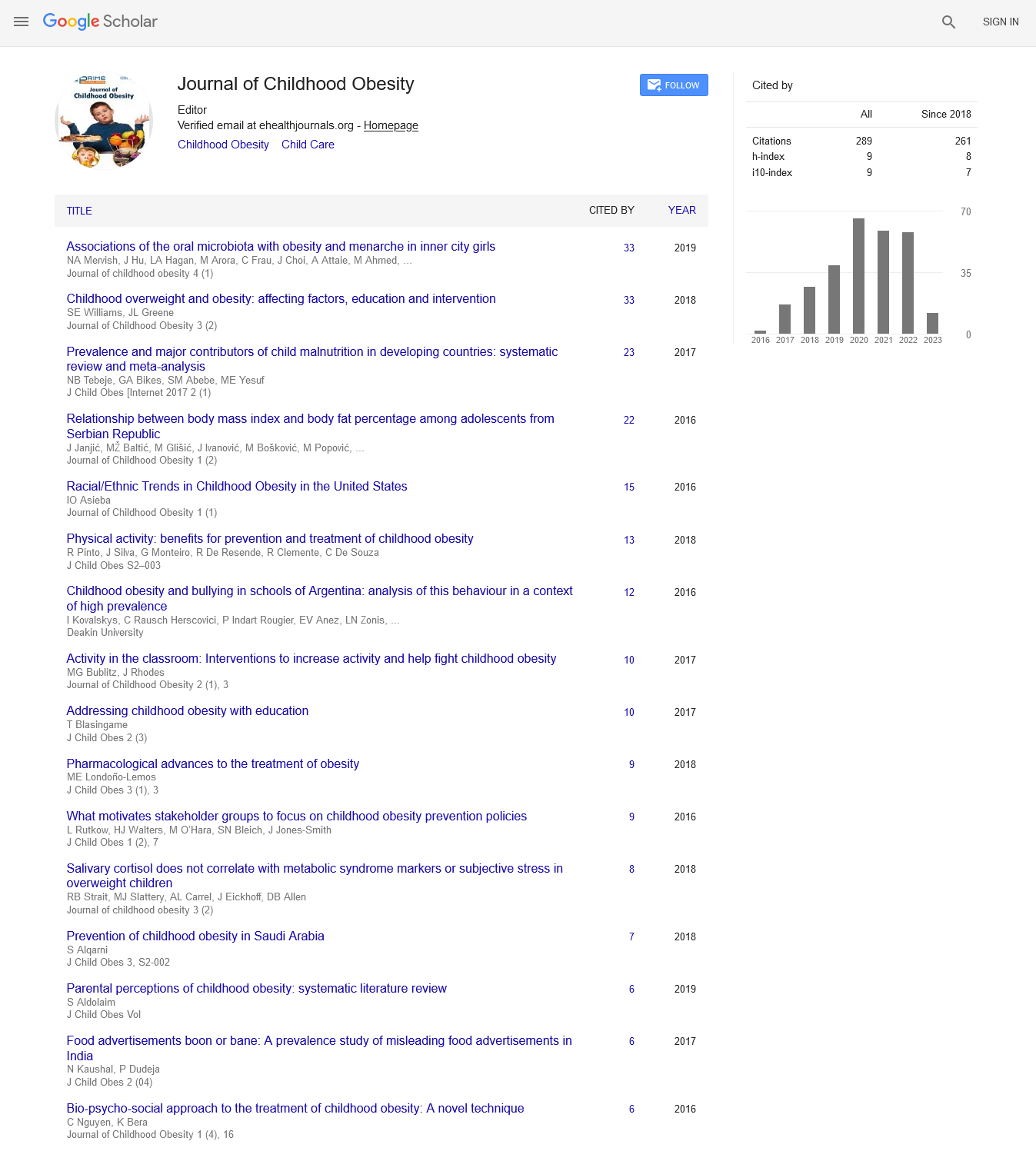Commentary - (2023) Volume 8, Issue 5
Nourishing Tomorrow: Optimal Dietary Patterns for Children Battling Obesity
Kingston Watkins*
Department of Health and Obestrics, Cornell University, United States of America
*Correspondence:
Kingston Watkins,
Department of Health and Obestrics, Cornell University,
United States of America,
Email:
Received: 02-Oct-2023, Manuscript No. ipjco-23-18446;
Editor assigned: 04-Oct-2023, Pre QC No. ipjco-23-18446 (PQ);
Reviewed: 18-Oct-2023, QC No. ipjco-23-18446;
Revised: 23-Oct-2023, Manuscript No. ipjco-23-18446 (R);
Published:
30-Oct-2023, DOI: 10.21767/2572-5394-23.8.47
Description
Childhood obesity is a pressing health concern with long-lasting
consequences, necessitating a focused approach to dietary
choices. Crafting a suitable dietary pattern for children with
obesity is crucial for not only addressing weight concerns but
also promoting overall health and well-being. This article explores
optimal dietary patterns tailored for children struggling
with obesity, emphasizing the importance of balance, nutrition,
and sustainable habits. Balanced Macronutrient Distribution
Achieving a balance in macronutrient intake is fundamental
for children with obesity. Instead of restrictive diets, focus
on providing a mix of carbohydrates, proteins, and healthy fats.
Emphasize complex carbohydrates from whole grains, lean proteins
such as poultry and fish, and sources of healthy fats like
avocados and nuts. This balance helps regulate blood sugar levels,
provides sustained energy, and supports healthy growth.
Portion Control and Regular Meals Encouraging portion control
is vital in managing calorie intake. Instead of large, infrequent
meals, advocate for smaller, regular meals and snacks throughout
the day. This approach helps prevent overeating, stabilizes
blood sugar levels, and maintains a more consistent metabolism,
contributing to weight management. Increased Fruit and
Vegetable Consumption Fruits and vegetables are rich in essential
vitamins, minerals, and fiber while being low in calories.
Encourage children to incorporate a variety of colorful fruits
and vegetables into their daily meals. These nutrient-dense
foods promote satiety, contribute to overall health, and aid in
weight management. Mindful Eating Practices promote eating
habits to enhance awareness of hunger and fullness cues. Encourage
children to savor their meals, eat without distractions,
and listen to their bodies. This approach fosters a healthier
relationship with food, reducing the likelihood of emotional
or binge eating Limiting Added Sugars and Processed Food Excessive
consumption of added sugars and processed foods is a
common contributor to childhood obesity. Advocate for reducing
sugary beverages, snacks, and highly processed foods. Opt
for whole, unprocessed foods that provide essential nutrients
without the added sugars and unhealthy additives. Hydration
adequate hydration is often overlooked but is crucial for overall
health. Encourage children to drink water throughout the
day and limit sugary drinks. Proper hydration supports metabolism,
aids digestion, and can help prevent overeating by reducing
feelings of thirst, which may be misinterpreted as hunger.
Family Involvement and Education Engage the entire family in
adopting healthy dietary patterns. Educate parents and caregivers
about nutrition, emphasizing the importance of leading
by example. Establishing a supportive environment at home
contributes to the success of dietary changes for the child with
obesity. Physical Activity While not a direct dietary pattern,
physical activity is a key component of a holistic approach to
managing childhood obesity. Encourage children to engage in
regular physical activity, fostering a healthy lifestyle. Physical
activity not only supports weight management but also contributes
to overall well-being. Professional Guidance Seek the
expertise of healthcare professionals, including pediatricians
and registered dietitians, to tailor dietary recommendations to
the specific needs of the child. Professional guidance ensures
that dietary changes are safe, effective, and sustainable for the
child’s individual circumstances. Crafting optimal dietary patterns
for children with obesity requires a holistic and individualized
approach. By focusing on balance, nutrition, and sustainable
habits, parents, caregivers, and healthcare professionals
can play a pivotal role in supporting the well-being of these
children.
Acknowledgement
None.
Conflict Of Interest
The author declares there is no conflict of interest in publishing
this article.
Citation: Watkins K (2023) Nourishing Tomorrow: Optimal Dietary Patterns for Children Battling Obesity. J Child Obesity. 8:47
Copyright: © 2023 Watkins K. This is an open-access article distributed under the terms of the Creative Commons Attribution License, which permits unrestricted use, distribution, and reproduction in any medium, provided the original author and source are credited.

